Let's imagine Leicester City history as a row of books lined up in order on a shelf - the book of Pearson, the book of Ranieri etc - one for each of the 42 men who've managed the club (some volumes a lot thicker than others).
Right in the middle, the book of Wallace sits next to the book of Milne. I'm fascinated by the contrast between these two. It's partly because the years they were in charge - 1978-1982 and 1982-1986, were my formative years as a City fan. And it's partly because each represents a classic managerial archetype - one loud and passionate, demanding that his players play the same way; the other quiet and thoughtful, encouraging a more patient approach (many clubs, as well as the England national team, have often swung back and forth repeatedly between those two poles, each new manager compensating for the perceived inadequacies of the former).
Despite their differences, Wallace and Milne have something very important in common - something none of those other 40 Leicester managers can boast. Their fathers each had a long and distinguished career in the game - Jock Wallace Senior and Jimmy Milne.
By following either of those father-and-son stories you can trace a history of British football in the twentieth century. But if you place the two stories side by side, it starts to get a bit kaleidoscopic. To describe that in detail would require a volume much thicker than we have room for here. So let's have a rapid-fire review of the highlights.
The East Coast of Scotland, 1911
In the early months of 1911, the fathers of two future Leicester City managers arrived. On January 24th 1911, James Low Milne was born in Dundee. On April 13th, John Martin Wallace was born in Edinburgh. Just 62 miles and 79 days separated the two events. But as their lives developed, they would be brought even closer together.
Flower of Scotland
Both spent their childhoods doing what almost all boys in Scotland did back then - kicking a makeshift football round inner city streets and parks at every opportunity. In the late 1920s, Scotland were arguably the strongest football nation in the world. The team known as the 'Wembley Wizards' had pulled off a sensational 5-1 victory over England, and if they had entered the inaugural World Cup in Uruguay, they might well have won it.
As the hosts lifted that trophy in the summer of 1930, Milne and Wallace were both 19, playing in Scottish Junior football (what the English call 'non-League'). James, known as 'Jimmy' to his teammates, was a right half, John, known as 'Jock', was a goalkeeper. Each was still playing in the city of his birth - Milne for Dundee Violet, Wallace for Wallyford Bluebell in Edinburgh.
Yes - that's really what the teams were called - both named after flowers. It was a tradition in Scotland. There were many teams called 'bluebell' and 'violet', and others were called 'primrose', and of course 'thistle' (it's very difficult to find a definitive explanation for this - perhaps foxestalk's Scotland correspondent @Vacamion could offer an opinion?)
In the following season, those young talents would bloom. Both signed for professional clubs. Jimmy stayed in his home town, joining Dundee United, while Jock left Edinburgh to join the Kirkcaldy-based club Raith Rovers. Now the distance between them halved - they were just 30 miles apart.
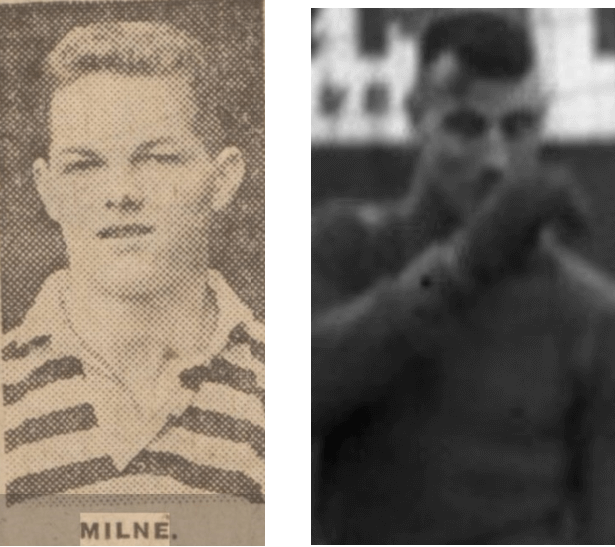
The proximity was not just geographical. Both clubs were in Scottish Division Two, and on February 14th 1931, their paths crossed for the first time. The match was at Stark's Park, and it finished Raith Rovers 0 Dundee United 0. You can see the team line-ups here:

Both would soon be heading for England. Milne signed for Preston North End in October 1932, and the following season Jock joined Blackpool. Despite their long journeys south of the border, they ended up even closer together. Now they were separated by less than twenty Lancashire miles, though Preston were in Division One and Blackpool in Division Two. The next time their paths crossed on the football field, both had become fathers.
This is where the biggest difference in the two stories appears. Jock Sr dreamed of playing for Scotland, and he had the same ambition for his son. He made sure his wife was back in Scotland for the birth so he would be eligible (the rules were strict back then). Jimmy Milne also aspired to international honours, but he was happy for his children to be born in England. The significance of that would become apparent three decades later.
Jock Wallace Jr was born on September 6th 1935 - in Edinburgh, Gordon Milne on March 29th 1937 - in Preston. Here's the Wallaces:
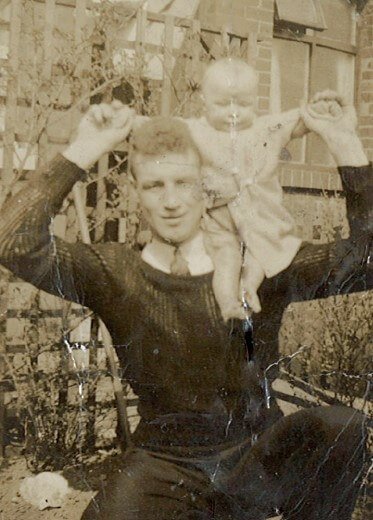
We don't have a similar picture of the Milnes. Not yet anyway. When Gordon's book is released next week there's a good chance we may get one - the title is 'Shankly, My Dad and Me'.
'Shankly' is Bill, of course - he was playing alongside Jimmy Milne in the Preston half back line. They were both in the side that faced Blackpool in October 1938, after the Tangerines had been promoted to the top flight. That was the game when our two main characters appeared not just in the same match, but also in the same cartoon. Preston's goal was scored by Milne himself - past Wallace - a half back doing what the forwards had failed to do - at least that was the angle taken by the Lancashire Evening Post:
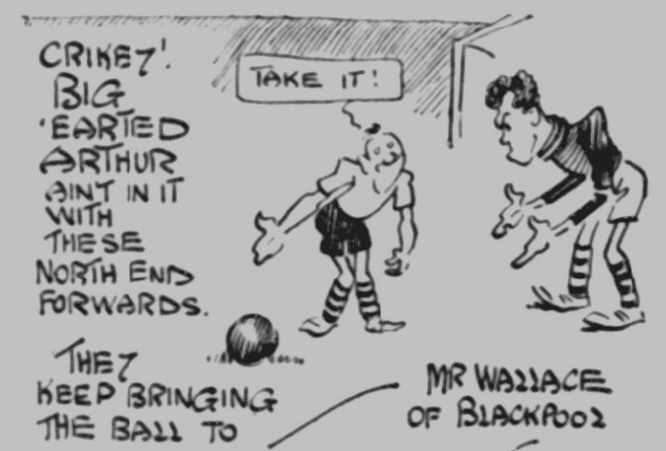
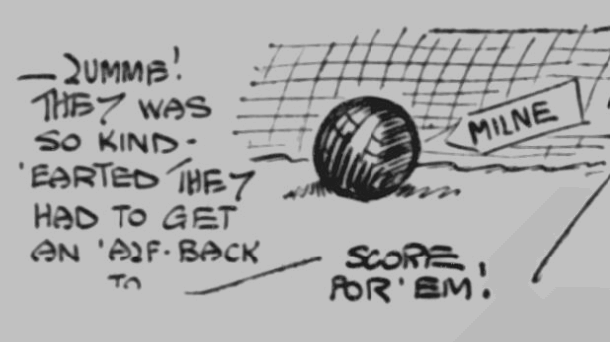
Like Father, Like Son
This is where the screen goes all woozy and we cross-fade to a scene 22 years into the future, with Wallace and Milne on opposing sides again. Wallace is still in goal, Milne is still at right half. Only this is the next generation.
It's January 2nd 1960, West Brom v Preston, and the only time Jock Jr and Gordon Milne faced each other on the football field. Jock was 24 but Albion were already the fifth team he'd played for. Gordon was still with his first club - and father Jimmy was still at Preston too. After retiring as a player he had become the club's trainer. West Brom won 4-0 that day, and below are the team line-ups. There they are in exactly the same position as in the game 29 years earlier when their fathers first opposed each other:
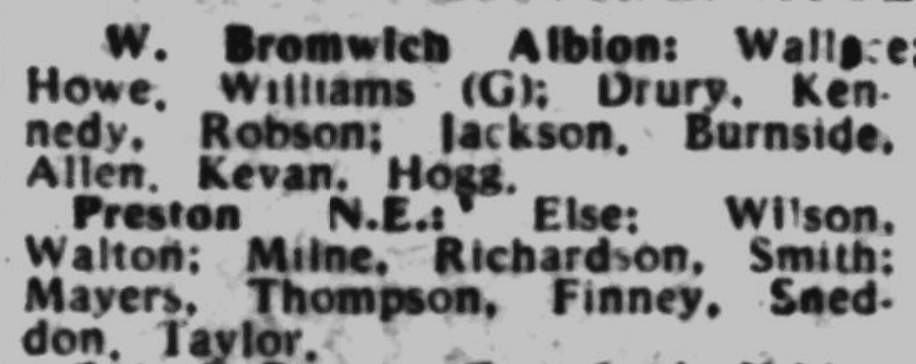
(Notice also 1950s Leicester hero Derek Hogg at outside left for Albion)
The presence of his father as trainer was a major reason Gordon wanted to get away from Deepdale. His dad was an inspiration, and he loved listening to his stories of football back in the day, but he wanted to be independent, and shortly afterwards came the move that really set him up - Bill Shankly signed him for Liverpool.
League titles and 14 England caps followed (he narrowly missed out on the 1966 World Cup squad). Jock Wallace Jr's later playing career, by contrast, was a disappointment. He never did win the Scotland cap his father hoped for, and he dropped into lower league football.
The two of them then moved into management in the early months of 1970, the stories still running in parallel. In the week his father turned 59, Gordon Milne was appointed player-manager of Wigan Athletic. And in the week his father turned 59, Jock Wallace was appointed assistant manager of Rangers. Jock's official title was 'assistant' but it was one of Glasgow's worst kept secrets that he was really in charge of the first team, with Willie Waddell more of a 'general manager'.
The most stunning coincidence in the story came next. Gordon's progress with Wigan was quickly noted by the Football Association, and in 1971 he was appointed manager of the England Youth Team (while continuing as Wigan boss). In May 1972 he tasted real success. With 18 year old Brian Little in the squad, England won the European Youth Championships, the tournament the press confusingly called 'the Little World Cup'. It received a lot of media coverage in those days:
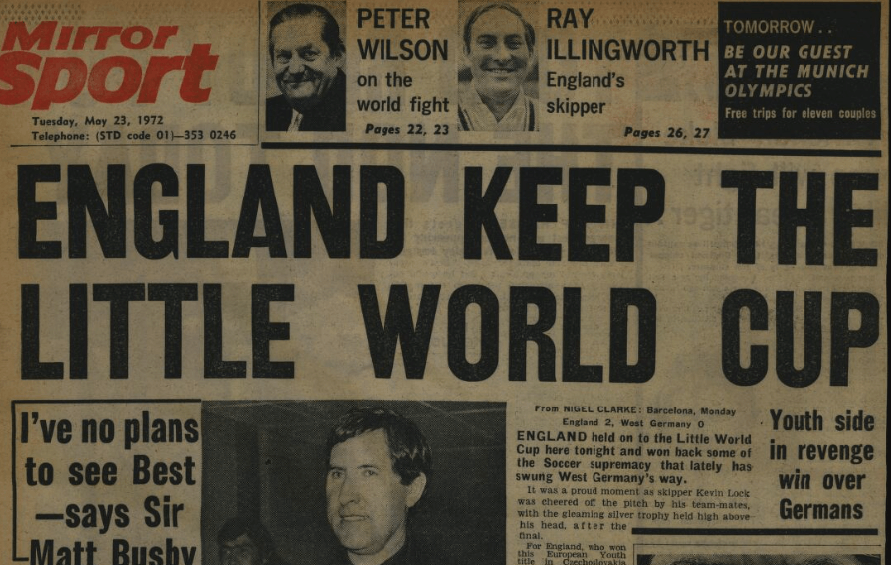
They won the trophy by beating West Germany 2-0 in the Final at the Nou Camp in Barcelona, and as Milne celebrated with his squad, another group of players from the UK arrived in the city. The European Cup Winners Cup Final was due to be played at the same venue two days later - between Dynamo Moscow and Rangers.
The Gers won 3- 2 - the greatest triumph of Jock's managerial career. It remains the club's only European trophy:
So Gordon Milne and Jock Wallace both led teams to victory in an international tournament for the first and only time - two days apart, in the same Catalonian stadium.
Those triumphs didn't go unrecognised. The following month, Gordon Milne made the massive leap from Northern Premier League to First Division - he was appointed team manager at Coventry City. And Rangers acknowledged the reality of the situation at Ibrox - changing Jock's official job title to 'Manager'.
The rest we can summarise quickly. The family dramas had run in parallel across two generations, and now the two sons followed each other at Filbert Street. Wallace was appointed Leicester boss in 1978, and he took us up to the First Division two years later - where Gordon Milne's Coventry City were waiting (separated by less than thirty miles again). The Sky Blues did the double over us that season, 1980/81 - so it was Milne 2 Wallace 0 in the managerial stakes. Had those results been reversed, we would have stayed up and Coventry would have gone down.
A year later the book of Wallace closed, and the book of Milne began...
There ends the dash through 75 years. We've barely scratched the surface. Jock Wallace's own career was featured on here in some detail last year. Gordon Milne deserves the same treatment, for the tale is just as dramatic. That's coming very soon - hopefully coinciding with the publication of his book next week.


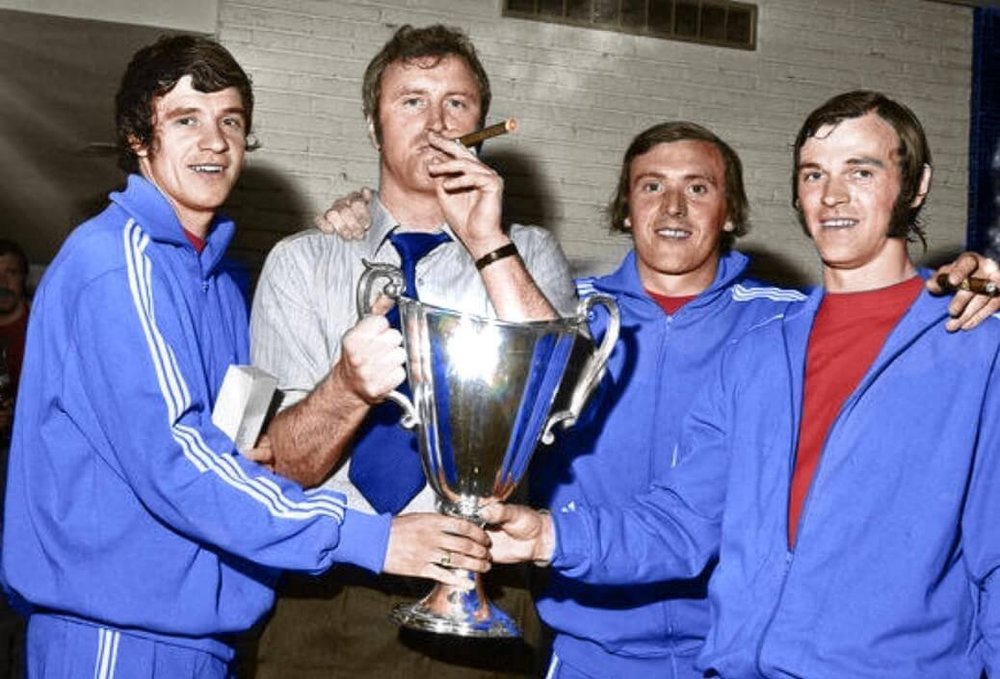
Recommended Comments
Join the conversation
You can post now and register later. If you have an account, sign in now to post with your account.
Note: Your post will require moderator approval before it will be visible.